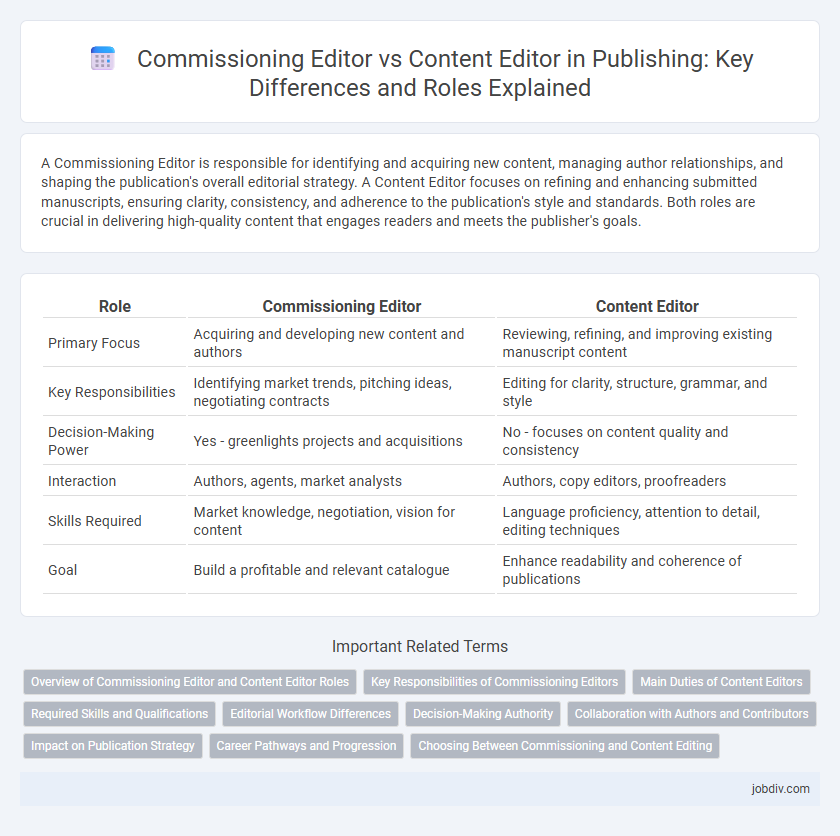A Commissioning Editor is responsible for identifying and acquiring new content, managing author relationships, and shaping the publication's overall editorial strategy. A Content Editor focuses on refining and enhancing submitted manuscripts, ensuring clarity, consistency, and adherence to the publication's style and standards. Both roles are crucial in delivering high-quality content that engages readers and meets the publisher's goals.
Table of Comparison
| Role | Commissioning Editor | Content Editor |
|---|---|---|
| Primary Focus | Acquiring and developing new content and authors | Reviewing, refining, and improving existing manuscript content |
| Key Responsibilities | Identifying market trends, pitching ideas, negotiating contracts | Editing for clarity, structure, grammar, and style |
| Decision-Making Power | Yes - greenlights projects and acquisitions | No - focuses on content quality and consistency |
| Interaction | Authors, agents, market analysts | Authors, copy editors, proofreaders |
| Skills Required | Market knowledge, negotiation, vision for content | Language proficiency, attention to detail, editing techniques |
| Goal | Build a profitable and relevant catalogue | Enhance readability and coherence of publications |
Overview of Commissioning Editor and Content Editor Roles
A Commissioning Editor identifies market trends, acquires new book projects, and manages author relationships to expand a publisher's catalog. A Content Editor focuses on refining manuscripts, improving structure, style, and clarity to ensure high-quality final publications. Both roles collaborate closely, with the Commissioning Editor driving content acquisition and the Content Editor enhancing the editorial quality.
Key Responsibilities of Commissioning Editors
Commissioning editors are responsible for identifying market trends, generating new content ideas, and securing authors or contributors to develop fresh material. Their role involves negotiating contracts, planning publication schedules, and overseeing project budgets to ensure timely delivery of content. They act as the bridge between authors and the publishing house, guiding manuscripts from proposal to final approval.
Main Duties of Content Editors
Content editors primarily focus on refining and shaping the structure, clarity, and tone of manuscripts to ensure they align with the publisher's standards and target audience preferences. They manage the editing process by supervising copyediting, proofreading, and fact-checking to maintain content accuracy and consistency. Content editors also collaborate closely with authors to enhance narrative flow and coherence while adhering to publication timelines.
Required Skills and Qualifications
Commissioning Editors require strong market analysis skills, editorial judgment, and negotiation abilities to secure authors and titles that align with publishing goals. Content Editors need expertise in language proficiency, attention to detail, and structural editing to refine manuscripts and enhance clarity, tone, and consistency. Both roles demand excellent communication, project management capabilities, and a deep understanding of publishing workflows and audience preferences.
Editorial Workflow Differences
A Commissioning Editor spearheads the acquisition of new content by identifying market trends and commissioning writers, shaping the publication's strategic direction early in the editorial workflow. In contrast, a Content Editor focuses on refining and polishing submitted manuscripts, ensuring clarity, coherence, and adherence to style guidelines during the later stages of editing. The editorial workflow distinguishes these roles by positioning the Commissioning Editor at the content inception phase and the Content Editor at the content development and quality control phase.
Decision-Making Authority
A Commissioning Editor holds greater decision-making authority by selecting and approving projects, commissioning authors, and shaping the editorial direction to meet market needs, whereas a Content Editor primarily focuses on refining and improving the content within those projects. Commissioning Editors evaluate proposals, negotiate contracts, and determine budget allocations, influencing which books or articles enter production. Content Editors execute detailed editorial planning, ensuring clarity, cohesion, and consistency without making strategic publication decisions.
Collaboration with Authors and Contributors
Commissioning editors play a crucial role in identifying and securing authors and contributors, establishing project scope and deadlines to align with publishing goals. Content editors collaborate closely with these authors to refine manuscripts, enhance clarity, and ensure consistency in style and voice throughout the publication. This collaboration between commissioning and content editors ensures a seamless process from acquisition to final content quality, producing polished and market-ready materials.
Impact on Publication Strategy
A Commissioning Editor shapes publication strategy by identifying market trends and acquiring relevant content that aligns with the publisher's goals, directly influencing the breadth and direction of the publication portfolio. Content Editors refine and enhance the acquired material to ensure clarity, coherence, and quality, boosting reader engagement and maintaining the publication's reputation. Together, their roles drive strategic content selection and quality control, optimizing the publication's market impact and audience reach.
Career Pathways and Progression
Commissioning Editors typically advance from roles such as Content Editors or Assistant Editors, gaining expertise in acquiring and developing book or article projects, while Content Editors often begin their careers focusing on manuscript refinement and editorial quality control. Career progression for Commissioning Editors involves strategic decision-making, market analysis, and author relations, positioning them towards senior editorial or publishing director roles. Content Editors develop specialized skills in editing and project management, creating opportunities to transition into Commissioning Editor roles or editorial management positions within publishing houses.
Choosing Between Commissioning and Content Editing
Choosing between commissioning and content editing hinges on the stage of the publishing process and editorial goals. Commissioning editors focus on acquiring manuscripts, evaluating proposals, and guiding authors to develop marketable content aligned with the publisher's strategy. Content editors concentrate on refining manuscripts, improving structure, clarity, and coherence to ensure high-quality, polished final publications.
Commissioning Editor vs Content Editor Infographic

 jobdiv.com
jobdiv.com